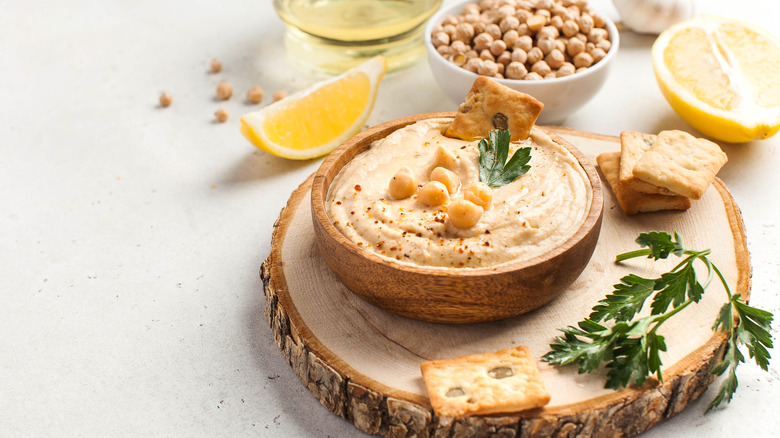Why You Probably Won't See Many People Eating Hummus In Greece
Just the words "Greek cuisine" are enough to make most foodies drool profusely. Moussaka, baklava, souvlaki, tzatziki, spanakopita — just hearing these names primes the taste buds for a delectable treat. But, if you are tempted to add hummus to this list, you are in for a bit of disappointment. Contrary to what you've been led to believe by restaurants dishing out Greek fare across America, hummus is not from Greece.
That's not to say that hummus isn't delicious. It's a tantalizing addition to almost anything — as a dip for veggies or pita bread, a spread for crackers, or smeared on your favorite sandwich. It's incredibly healthy, boasting a sizable wallop of plant protein, natural antioxidants and anti-inflammatories, possible cholesterol-lowering properties, and gut-loving fiber. And it's easy to make at home, with most recipes requiring just chickpeas, tahini, garlic, olive oil, and lemon juice. But what land does this scrumptious dip/sauce/condiment call "home"?
There is much debate over the birthplace of hummus
One wouldn't think that something as simple as the origin of hummus would spark heated debates — but it does. This food truly suffers from an identity crisis. Some say that it dates back to 13th century Egypt. Others say it hails from the Sham region of the Middle East, which includes Lebanon, Syria, Palestine, and Jordan. And some contend that the roots of hummus are Jewish. But, no matter which of these claims is actually true, one fact remains — the world owes a debt of gratitude to somewhere in the Middle East.
So what homebred dips and spreads would someone find on the hills of Santorini, in the medieval city of Rhodes, or amongst the hustle and bustle of Athens? The most well-known Greek dip would be tzatziki — a fresh-tasting concoction made from cucumber, Greek yogurt, garlic, and olive oil that is readily available across North America. You would also find skordalia, a potato-based dip with olive oil and garlic used for dunking bread or meatballs. Tirokafteri is a Greek favorite with a feta and yogurt base that goes well with warm pita. And, finally, you would encounter melitzanosalata, an eggplant, garlic, and olive oil dip that usually accompanies rustic bread.
There are plenty of options if you wish to devour authentic Greek fare. But, if you have your heart set on hummus, who really cares where it was born? Humans may not always be able to get along, but foods can coexist on dinner plates quite amicably. So go ahead — dip that Greek flatbread in your Middle Eastern hummus and enjoy.

